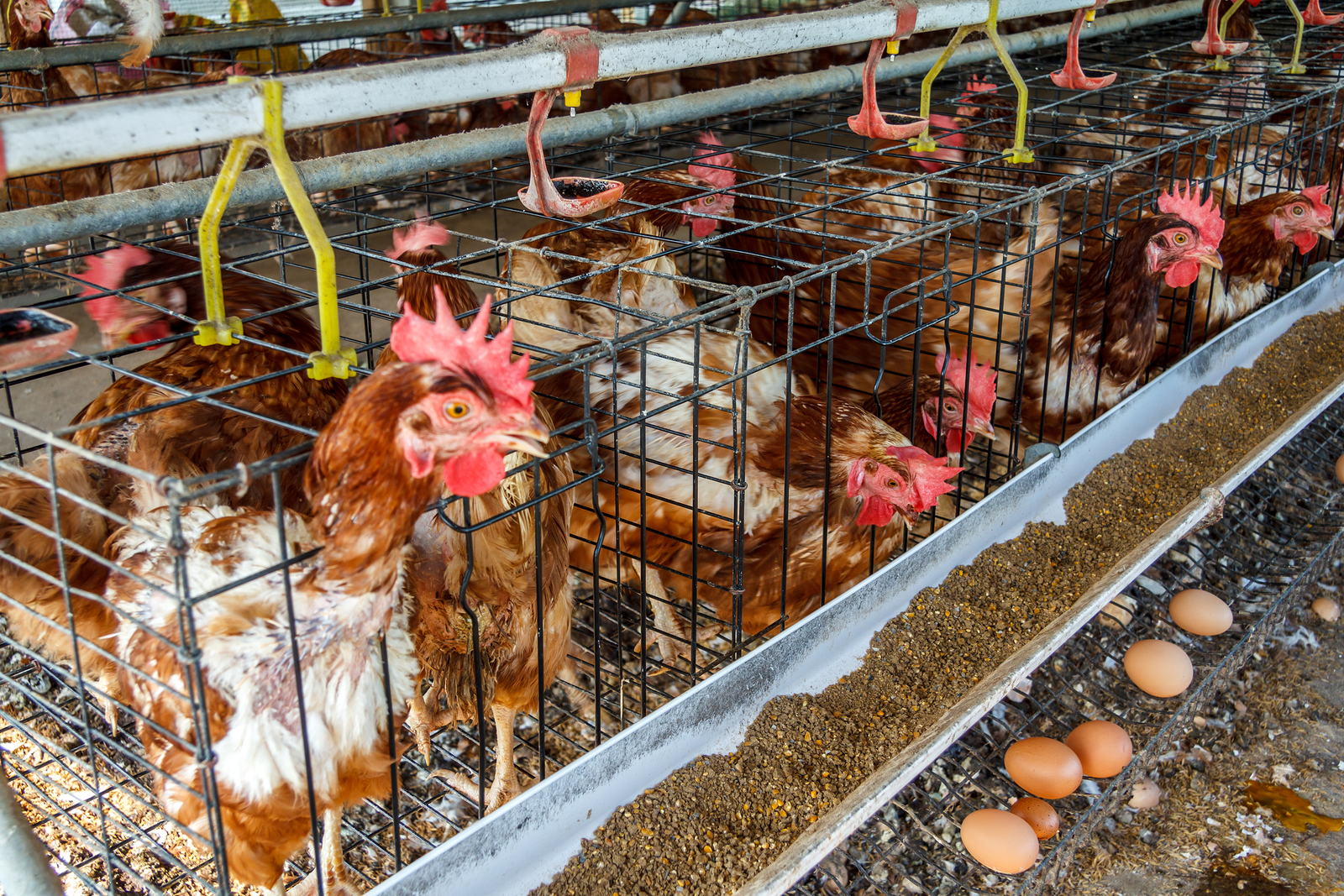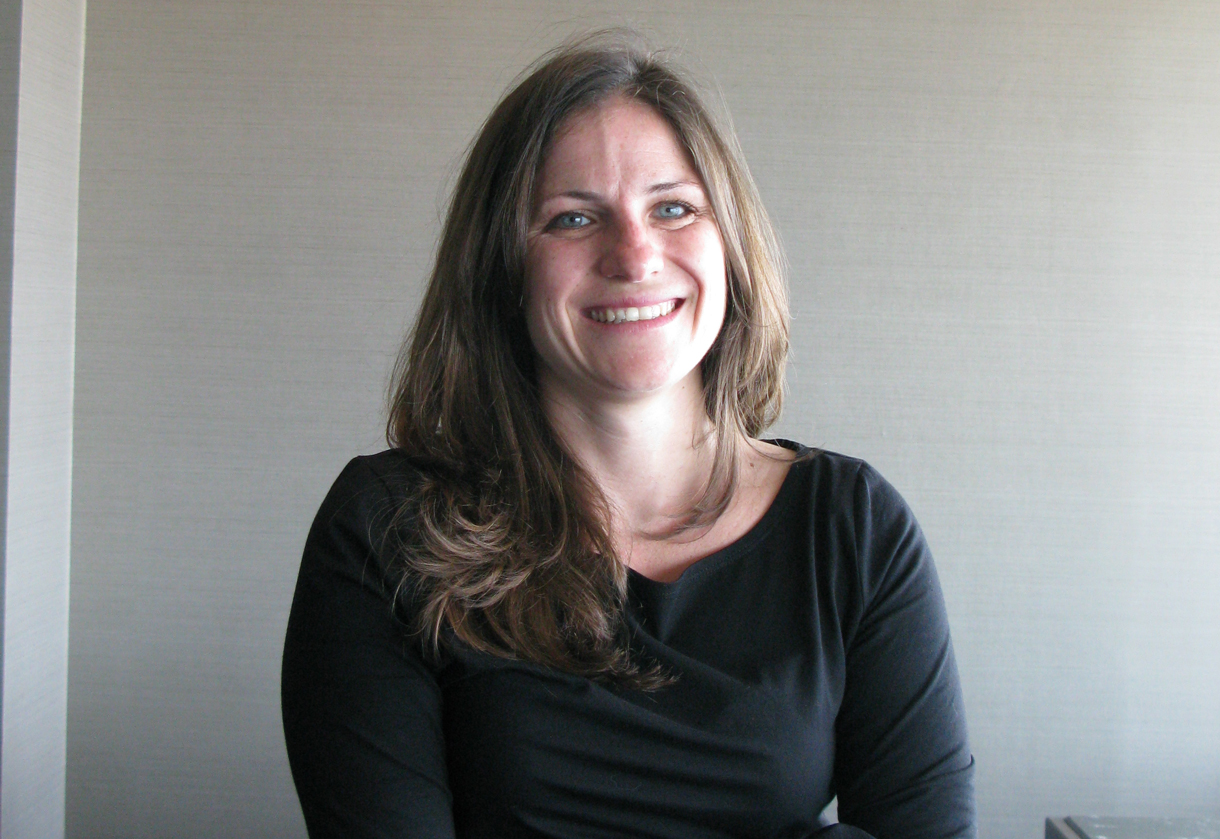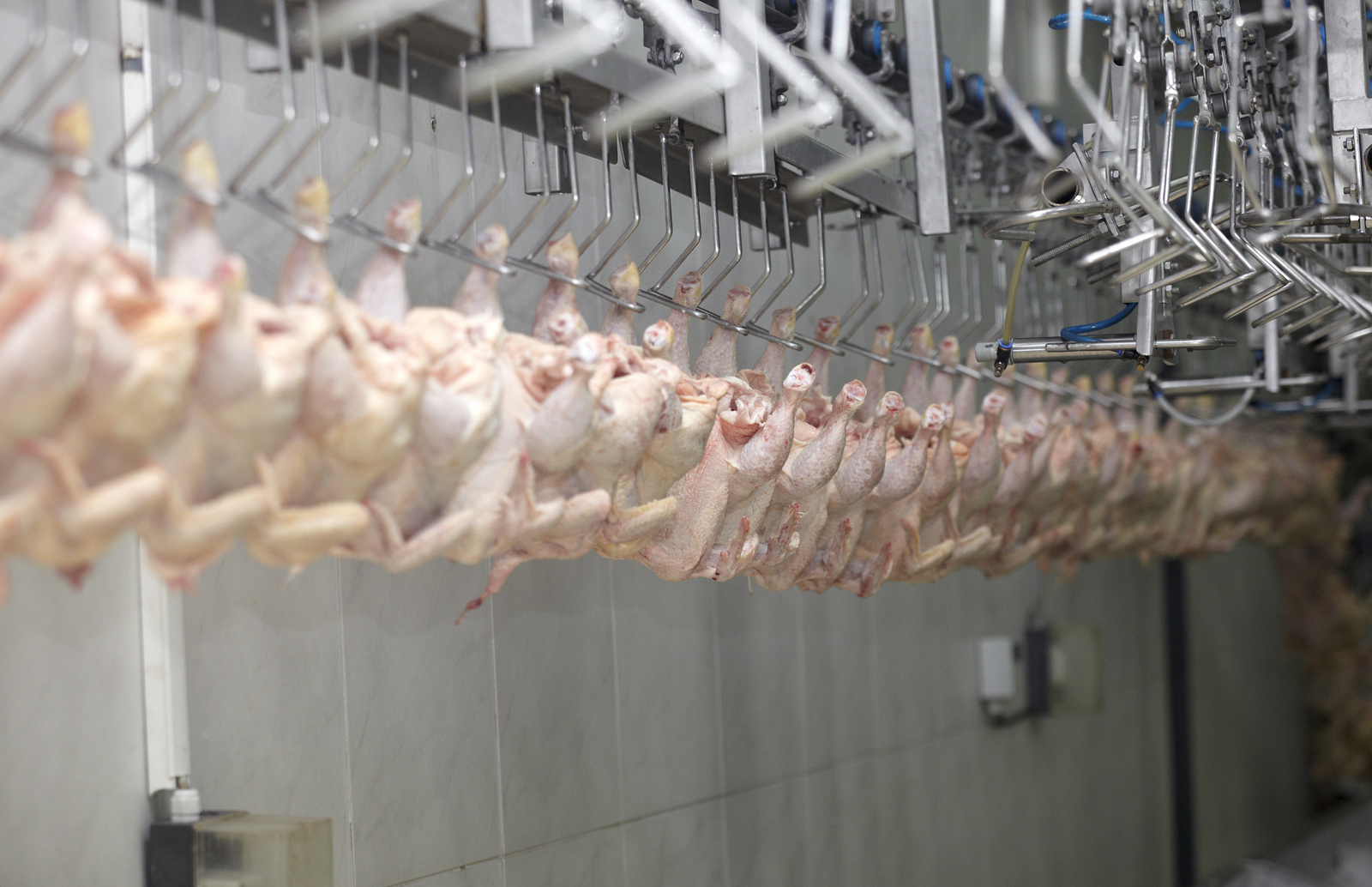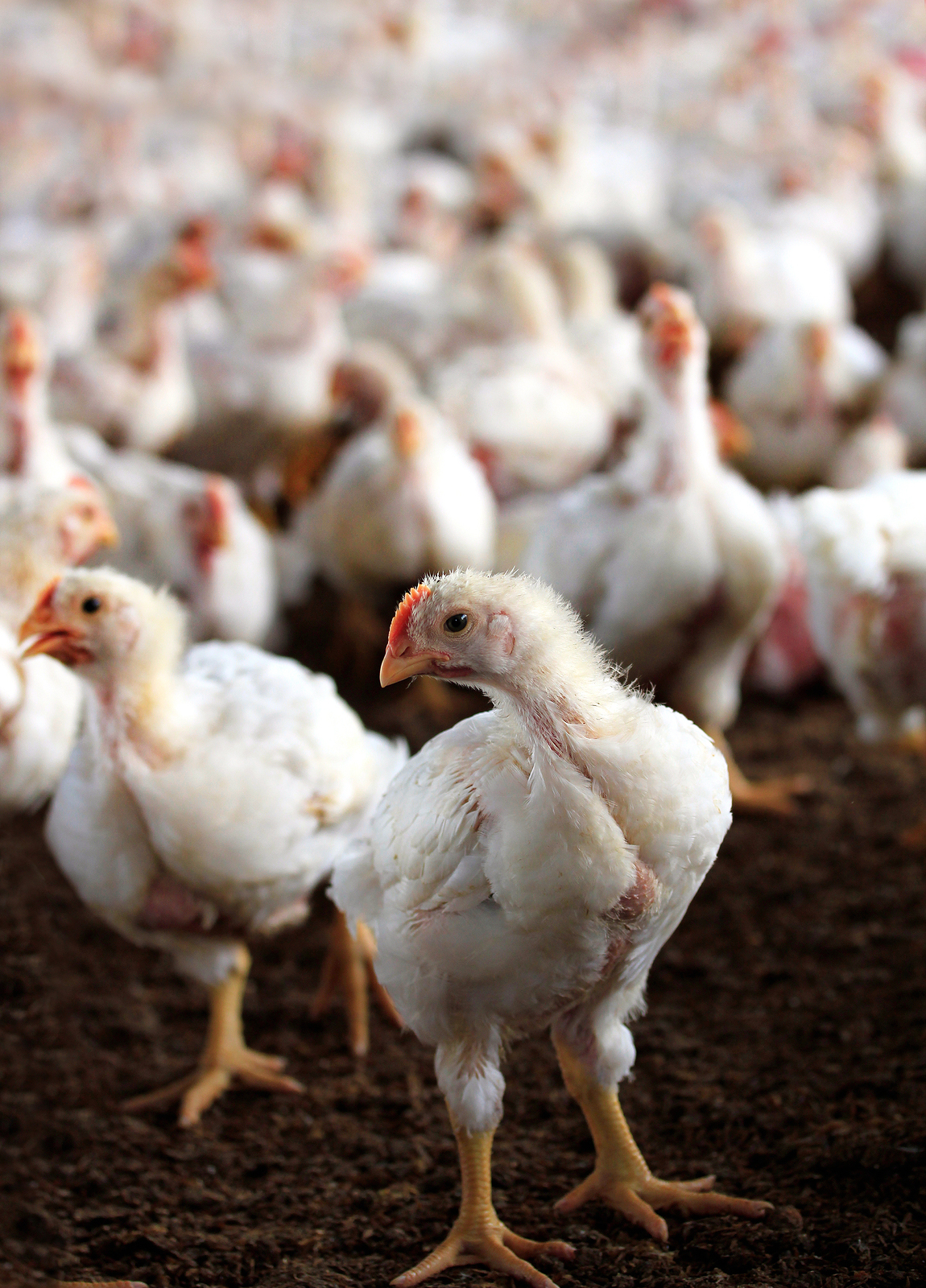FDA Bans (Most) Arsenic in Chicken Feed
Air Date: Week of October 4, 2013

Caged chickens (photo: bigstockphoto.com)
The Center for Food Safety petitioned the FDA to ban arsenic in feed additives for chicken and turkey four years ago. There was no response, until now. CFS lawyer Paige Tomaselli explains to host Steve Curwood that the FDA has ruled all but one arsenic-containing feed products must be removed from the market.
Transcript
CURWOOD: From the Jennifer and Ted Stanley Studios in Boston this is Living on Earth.
I’m Steve Curwood. We begin our program today with some good news for consumers. Back in May, we reported that a major study found that most supermarket chicken and just about all fast food chicken contained arsenic from a feed supplement to promote faster growth. Paige Tomaselli, an attorney with the Center for Food Safety told us her organization had filed a legal petition back in 2009 to force the Food and Drug Administration to ban arsenic from the food chain with little effect.

TOMASELLI: It's been three-and-a-half years, and the FDA has not responded to the petition, which is why we filed a lawsuit asking them to immediately respond to the petition. Should they deny the petition then we would consider filing an additional lawsuit for their failure to grant this citizen petition.
CURWOOD: Well, now that's all changed, and Paige Tomaselli joins us again to bring us the good news. Paige, what happened?
TOMASELLI: The FDA says they’re going to withdraw arsenic-based feed additives - three out of four arsenic-based feed additives - from the market - so therefore producers of chickens and turkeys and pigs will no longer be able to use these feed additives. We are definitely pleased with FDA’s response. We feel that the withdrawal of these harmful feed additives is a major victory for consumers, and it serves to improve our food system. It’s unfortunate that the legal pressure was necessary to spur action by FDA, but in the end, we’re happy that FDA has listened to our demands and is now working to rid arsenic from the meat supply.
CURWOOD: Now remind us, how does arsenic work its way into the chicken that we eat?
TOMASELLI: Arsenic-based feed additives are fed to animals as part of their diets. These feed additives are made from organic arsenic; however, the organic arsenic converts to inorganic arsenic in the gut of a chicken, and when the animal is slaughtered, the inorganic arsenic, which is a known human carcinogen, remains in the animal and is present in the product that consumers purchase.

Paige Tomaselli (photo: Paige Tomaselli)
CURWOOD: So if chickens have been fed this, and people eat the chickens, they’re getting arsenic.
TOMASELLI: That’s right.
CURWOOD: Now, a petition, of course, is legalese for the first stage of a lawsuit against the federal government right?
TOMASELLI: That’s correct.
CURWOOD: And so, your lawsuit is now off the table, or...
TOMASELLI: No, the lawsuit is still pending. The FDA and Center for Food Safety made an agreement whereby they would respond to the petition by the first of October, which they have, and now we have 60 days to amend our complaint to challenge their response to the petition.
CURWOOD: So, you’re mostly thrilled, but not completely. Why?

Poultry processing plant (photo: bigstockphoto.com)
TOMASELLI: That’s right. We’re mostly thrilled, but FDA has banned three out of four of the arsenic-based feed additives. There’s one remaining arsenic-based feed additive, Nitrazone, that is still allowed to be used in the feed supply.
CURWOOD: OK. This is radio. You can’t see me scratching my head, but wait a second, if arsenic isn’t safe, then arsenic isn’t safe. Why is one of these being allowed to go forward?
TOMASELLI: It’s unclear to us why FDA is allowing the Nitrazone to be continued to be used in the food supply. Nitrazine is used for weight gain; it increases feed efficiency in turkeys and chickens like the other feed additives, Nitrazine is used by the same manufacturer as one of the feed additives, Roxarzone, which they pulled off the shelf in 2011.
CURWOOD: How did the companies respond to your petition?
TOMASELLI: The companies eventually voluntarily withdrew three out of the four arsenic-based feed additives from the market. After pressure from FDA, studies that came out by FDA and John Hopkins, our petition and consumer demand, but they decided to leave Nitrazone on the market.
CURWOOD: So, in the other words, the FDA has only set by regulation withdrawal of those items the companies said they were willing to withdraw.

Young chickens on a poultry farm (photo: bigstockphoto.com)
TOMASELLI: That is correct, and so we think FDA is basically taking the low-hanging fruit. They’ve withdrawn the arsenicals that were already voluntarily withdrawn by the companies, but they have refused to make a decision on the remaining arsenic-based feed additive Nitrazone that is still on the market, and is still being used in turkeys and chickens today.
CURWOOD: What’s the time table here? Since we last spoke I’ve been feeling, well, I have to admit, a bit uneasy about eating chicken from various sources, including the food trucks outside our office. When will this, at least partial ban go into effect?
TOMASELLI: Well, hopefully, the partial ban will go into effect soon, and then FDA has stated that it will continue to collect data on Nitrazone, and make a decision on whether or not to withdraw the last arsenic-based feed additive in 2014. Now that this issue has national attention, is in the public eye, we think it’s incumbent upon FDA to either prove the safety of the remaining arsenical drug - something we don’t think they’re going to be able to do - or withdraw the last arsenical drug from the market, so we’re hoping it happens sometime in 2014, if not sooner.
CURWOOD: What role might the government shutdown play in these efforts to withdraw these feed additives.
TOMASELLI: Well, until the government comes back online, and FDA workers are working, they can’t permanently withdraw these feed additives. So while FDA has promised that a ban will be in place, it still needs to follow through once employees are working again, and officially withdraw the animal drug applications for these feed additives.
CURWOOD: Paige, before you go, and I know you’re a lawyer, but do you have any advice for consumers about chicken?
TOMASELLI: Well, the withdrawal of the majority of the arsenic-based feed additives, I think, is a step in the right direction, but until we can eliminate all arsenic from the meat supply, and from our food supply in general, there’s still cause for concern, so I think consumers should still try and purchase organic meat, or meat from producers that they know do not use arsenic or other animal feed additives that are known to cause problems for human beings.
CURWOOD: Paige Tomaselli is a Senior Staff Attorney at the Center for Food Safety in San Francisco. Thanks for coming on the show, Paige.
TOMASELLI: Thank you very much, Steve.
Links
Living on Earth wants to hear from you!
Living on Earth
62 Calef Highway, Suite 212
Lee, NH 03861
Telephone: 617-287-4121
E-mail: comments@loe.org
Newsletter [Click here]
Donate to Living on Earth!
Living on Earth is an independent media program and relies entirely on contributions from listeners and institutions supporting public service. Please donate now to preserve an independent environmental voice.
NewsletterLiving on Earth offers a weekly delivery of the show's rundown to your mailbox. Sign up for our newsletter today!
 Sailors For The Sea: Be the change you want to sea.
Sailors For The Sea: Be the change you want to sea.
 The Grantham Foundation for the Protection of the Environment: Committed to protecting and improving the health of the global environment.
The Grantham Foundation for the Protection of the Environment: Committed to protecting and improving the health of the global environment.
 Contribute to Living on Earth and receive, as our gift to you, an archival print of one of Mark Seth Lender's extraordinary wildlife photographs. Follow the link to see Mark's current collection of photographs.
Contribute to Living on Earth and receive, as our gift to you, an archival print of one of Mark Seth Lender's extraordinary wildlife photographs. Follow the link to see Mark's current collection of photographs.
 Buy a signed copy of Mark Seth Lender's book Smeagull the Seagull & support Living on Earth
Buy a signed copy of Mark Seth Lender's book Smeagull the Seagull & support Living on Earth

